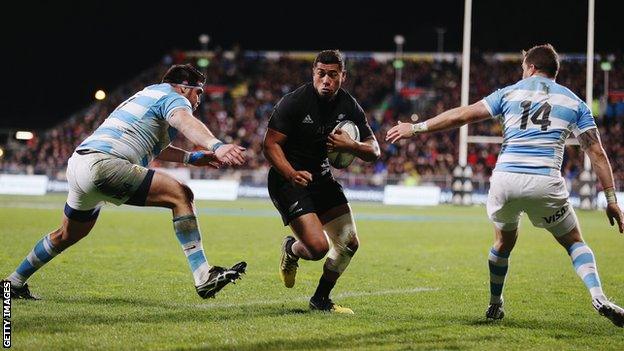World Rugby changes rules to allow players to switch national teams
- Published
- comments

Charles Piutau has played for New Zealand but under the new rules would be able to play for Tonga in the future
A revolutionary change to rugby union's international eligibility rules has been approved by World Rugby.
It means from January 2022 a player will now be able to represent a different country after a stand-down period of three years.
A player can move to a nation of their, their parents' or grandparents' birth, but can only switch allegiance once.
In a surprise move, the ruling was passed on Wednesday by more than 75% of the World Rugby council votes.
Under the current regulations, a player is 'captured' once they have won a senior cap - and are thereafter tied to that country and unable to play for another nation.
However the new process will see players able to play for two different countries during the course of their international career.
World Rugby believes the change will "benefit players and the global competitiveness of rugby".
The chairman of the governing body Bill Beaumont added: "We have listened to our membership and players and sought to update the regulation recognising the modern professional rugby environment without compromising the integrity of the international game."
The move has also been backed by the global players' union, which says the decision is the culmination of years of work with its members and had unanimous support from players worldwide.
"Many players across the world will now benefit from the chance to represent the country of their or their ancestors' birth, serving as a real boost to the competitiveness of emerging nations, which in turn will benefit the game as a whole," said International Rugby Players (IRP) chief executive Omar Hassanein.
However, while this will help the likes of Tonga and Samoa - with former All Black Charles Piutau among those who will switch nationality - there will be strong opposition from other emerging nations who prioritise the selection of home-grown players and may not benefit from the ruling.
From 1 January 2022, any player who meets the criteria can apply immediately for a transfer, meaning there is a possibility that in the 2022 Six Nations a player may represent a second country in the tournament.
As an example, Saracens back Alex Lozowski, who last played for England in 2018, is now eligible to play for Italy through a grandparent.
David Quinlan, IRP head of legal and player welfare, admits there is a "possibility" the ruling could be exploited, but believes the prospect of players switching between major nations is "remote".
"There are people who would have serious concerns at the current set-up, where you have Ireland beating the All Blacks with three Kiwis in the team," Quinlan told BBC Sport.
"So I don't think there is any perfect solution here, and in rugby we have a very unique landscape.
"The Pacific Islands comprise a huge percentage of our playing population yet at an international level they are not as competitive as they should be given the quality of players they are providing to the world game.
"So I would see this as a solution to a unique problem. With the three-year stand-down period, if someone is out of international rugby for three years, it is highly unlikely they will be able to switch across to any of the Six Nations sides and stake a claim.
"There are all sorts of consequences that could come of this [ruling], intended and unintended, but I would see that as a fairly remote risk in the grand scheme."

'I was more of a continental player': Glenn Hoddle shares an insight into his life in football
Are con artists pathological liars? The man who manipulated his way into the lives of the rich and famous
